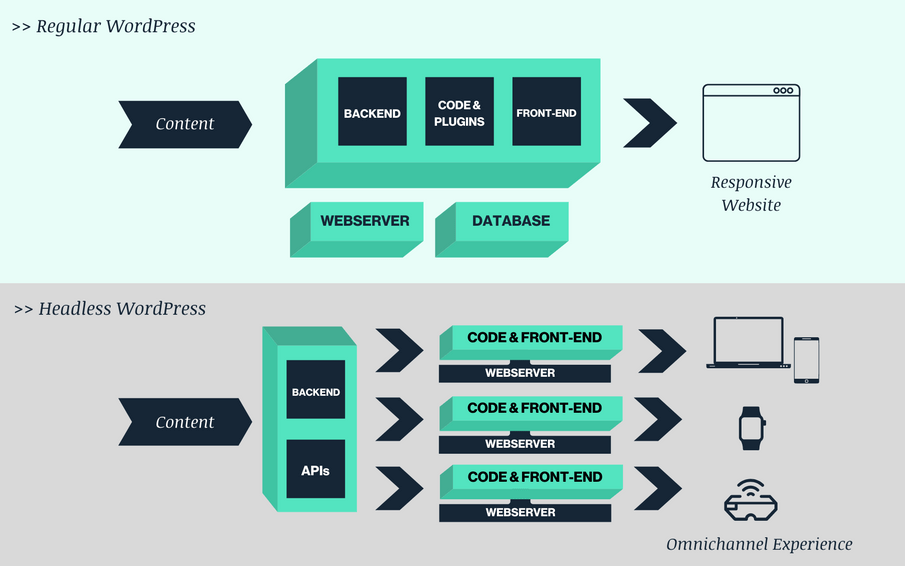What Does It All Mean When Industry Members Refer to Decoupling or Headless CMS Solutions?
November 17, 2021
Decoupling is the keyword to explain what makes a WordPress site considered to be headless. In this case, it occurs by separating the front-end and backend structures, which traditionally act as a unit in a traditional CMS architecture.
A headless CMS extends the back-end solution to front-end development frameworks, maintaining the content capabilities while including a familiar and comfortable user interface dedicated to content development for marketing teams rather than requiring developer interactions. On the other hand, developers have more freedom in exploring various front-end technologies, innovations, and flexibility aimed at improving different aspects of the user experience and the desired final product.
Strategically speaking, the headless solution is not the most suitable for small businesses, as it requires a strong development team focused on this type of project in addition to the overall infrastructure requirements. Still, it has been identified as a promising solution in terms of content creation, scale, flexibility and future-proofing at the enterprise level, especially for businesses that are already focusing or planning on dedicating their efforts to omnichannel digital applications and communications.
To infinity and beyond
By managing content and data independently of the user experience layer, a headless CMS can deliver the most diverse types of content, media, and data to any digital channel without prejudice to its formatting or presentation, through the WordPress REST API or GraphQL. Basically, each API will expose the raw content offered by the CMS, and deliver it to the application in a way that can be integrated as required by developers and for the digital channel. This not only multiplies the possibilities of sharing content and information but extends the reach of the CMS for unlimited integrations.
Speaking of the beyond, it is unavoidable to mention that headless CMS provides more manageable and safer redesigning possibilities for all teams involved since it’s no longer always necessary to take the site down for maintenance or updates. It is possible, among other things, to update the entire structure and language and simply connect the WordPress CMS API to the new site. As a competitive decision, this can save time and effort in finding a CMS that merely meets the demand of your current application requirements, and extends it beyond for your next application need or trending channel integrations, placing your company at the forefront with a competitive advantage, innovation and flexibility for the future.
Performance & security
Being an API-driven website, the backend CMS can be more secure from common threats as the CMS is not as exposed to the web, and it now serves the front-end layer with data distribution. Each interaction made with the site, such as a simple click, is mediated by the application and a server side response, making front-end security threats more difficult to breach. Also, being a modern technology that demands deep development expertise, many security threats are mitigated given the decoupled nature of the solution and difficulty with traditional attack tactics and providing more opportunities to harden admin access.
When removing the front-end from the equation, only the data, content and files needed for each digital channel are loaded via a given API. In the end, the website becomes lighter, more agile and results in user retention rather than high bounce rates.
A headless TK
To ensure that we stay relevant to the changing demands of client needs and the platforms that make up our global technologies, we decided to turn our website into a headless WordPress. From our own experience, it’s safe to say that the headless solution is incredibly fast and performant versus traditional WordPress.
The ultimate goal is to provide our clients with more cost-effective long-term platforms to build and maintain, exploring the best of future-proofing solutions to reduce investment and time to market when pivoting from significant design overhauls, developing new applications, or changing front-end coding languages to modern frameworks.
Ready for more effective content management?
At Trew Knowledge, our goal is to help you grow through smart, strategic and agile content management. We’re here to guide you on implementing future-proof content-first approach, headless content architecture, omnichannel integrations, SEO friendly CMS, and more. Need answers? Start a conversation with our experts.

